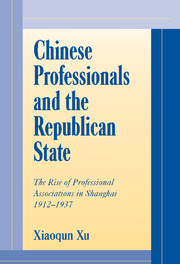 Chinese Professionals and the Republican State
Chinese Professionals and the Republican State Book contents
- Frontmatter
- Contents
- List of Tables
- Acknowledgments
- Abbreviations of Frequently Cited Sources
- Introduction
- Part I Professions and Professionals
- Part II Social Institutions, State Actions, and Professionalization
- 3 The Republican State and Urban Associations
- 4 The Republican State and the Legal Profession
- 5 The Republican State and the Medical Profession
- Conclusion to Part II
- Part III Professionalism, Nationalism, and Politics
- Conclusion
- Glossary
- Bibliography
- Index
5 - The Republican State and the Medical Profession
Published online by Cambridge University Press: 07 September 2009
- Frontmatter
- Contents
- List of Tables
- Acknowledgments
- Abbreviations of Frequently Cited Sources
- Introduction
- Part I Professions and Professionals
- Part II Social Institutions, State Actions, and Professionalization
- 3 The Republican State and Urban Associations
- 4 The Republican State and the Legal Profession
- 5 The Republican State and the Medical Profession
- Conclusion to Part II
- Part III Professionalism, Nationalism, and Politics
- Conclusion
- Glossary
- Bibliography
- Index
Summary
THE ROLE of the state in Chinese medical professionalization was a quite different story from its role in the legal professionalization. The Republican state paid much greater attention to the regulation of the legal profession and the judicial system, because modern state building required, and foreign powers demanded in exchange for their relinquishing extraterritoriality, the establishment of a modern Chinese judiciary. In contrast, the Republican state recognized the importance of medicine and public health as the domain for state action slowly and haphazardly.
Moreover, while traditional China did not have the legal profession (in spite of songshi) or an independent judicial system, native medicine did have a long and rich tradition. In the early twentieth century when Western medicine had been introduced into China for decades, native medicine continued to provide medical treatment for the majority of the Chinese population. When the state began to regulate medicine and the medical profession, it would immediately confront the question of whether medical professionalization and the development of medical science should entail the demise of native medicine. During the Beiyang period and much of the Nanjing Decade, an ambivalent attitude and an ambiguous policy toward native medicine on the part of the Republican state were important elements in the state's neglect of medicine and public health as a whole.
- Type
- Chapter
- Information
- Chinese Professionals and the Republican StateThe Rise of Professional Associations in Shanghai, 1912–1937, pp. 129 - 154Publisher: Cambridge University PressPrint publication year: 2000
